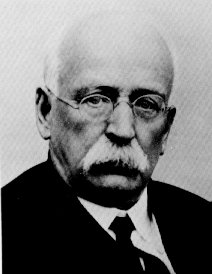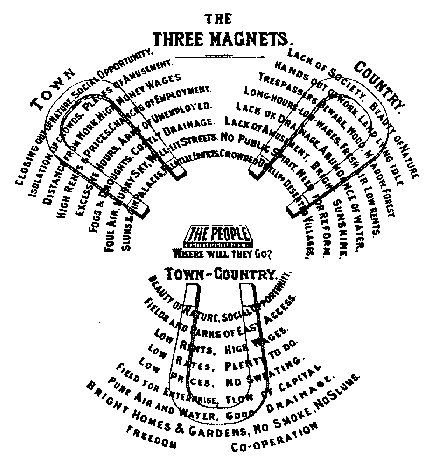田园城市理论(英语:Garden Cities),也称为花园城市或田园都市,是埃比尼泽·霍华德提出的一种将人类社区包围于田地或花园的区域之中,平衡住宅、工业和农业区域的比例的一种城市规划理念
田园城市的概念最早由英国的埃比尼泽·霍华德爵士于1898年在其著作《明日的田园城市》中提出。此后于1899年成立了一个花园城市协会,在1903年和1920年建立了两个试验性质的花园城市:列曲沃斯花园城市和威尔温花园城市。两个城市虽然没有完全体现埃比尼泽·霍华德爵士的设计思想,但是直到今天两个城市都仍然是健康和持续发展的社区。
埃比尼泽·霍华德爵士的继任者弗列德瑞克·欧斯朋爵士将这种设计延伸到区域规划领域。
花园城市的设计思想在西方产生了很大影响,此后美国,加拿大,澳洲、阿根廷,德国建立了一批花园城市。二战之后,英国的新城镇法案拉开了大量建设花园城市的序幕。
花园城市思想被英国规划师派崔克·杰地斯实践到以色列城市特拉维夫的建设,当代很多城市规划思想都来源于花园城市思想。
今天,世界上存在大量的花园城市,但是他们仅仅作为居民区来设计,这于埃比尼泽·霍华德爵士平衡住宅,工业和农业的思想是不同的。
埃比尼泽·霍华德(Ebenezer Howard,1850年1月29日-1928年5月1日[1][2]),英国城市学家、社会活动家,“田园城市”运动的创始人、现代城市规划的奠基人之一。他最为知名的著作是其1898年出版的《明日的田园城市》(Garden Cities of To-morrow)。[3]他提出的理想主义与现实主义结合的田园城市,开创了现代意义上的城市规划,即現今的新市鎮
The text reads:
THE THREE MAGNETS
THE PEOPLE
Where will they go?
Town
Closing out of nature. Social opportunity.
Isolation of crowds. Places of amusement.
Distance from work. High money wages.
High rents & prices. Chances of employment.
Excessive hours. Army of unemployed.
Fogs and droughts. Costly drainage.
Foul air. Murky sky. Well-lit streets.
Slums & gin palaces. Palatial edifices.
Country
Lack of society. Beauty of nature.
Hands out of work. Land lying idle.
Trespassers beware. Wood, meadow, forest.
Long hours, low wages. Fresh air. Low rents.
Lack of drainage. Abundance of water.
Lack of amusement. Bright sunshine.
No public spirit. Need for reform.
Crowded dwellings. Deserted villages.
Town-Country
Beauty of nature. Social opportunity.
Fields and parks of easy access.
Low rents, high wages.
Low rates, plenty to do.
Low prices, no sweating.
Field for enterprise, flow of capital.
Pure air and water, good drainage.
Bright homes & gardens, no smoke, no slums.
Freedom. Co-operation.
wiki
/>
